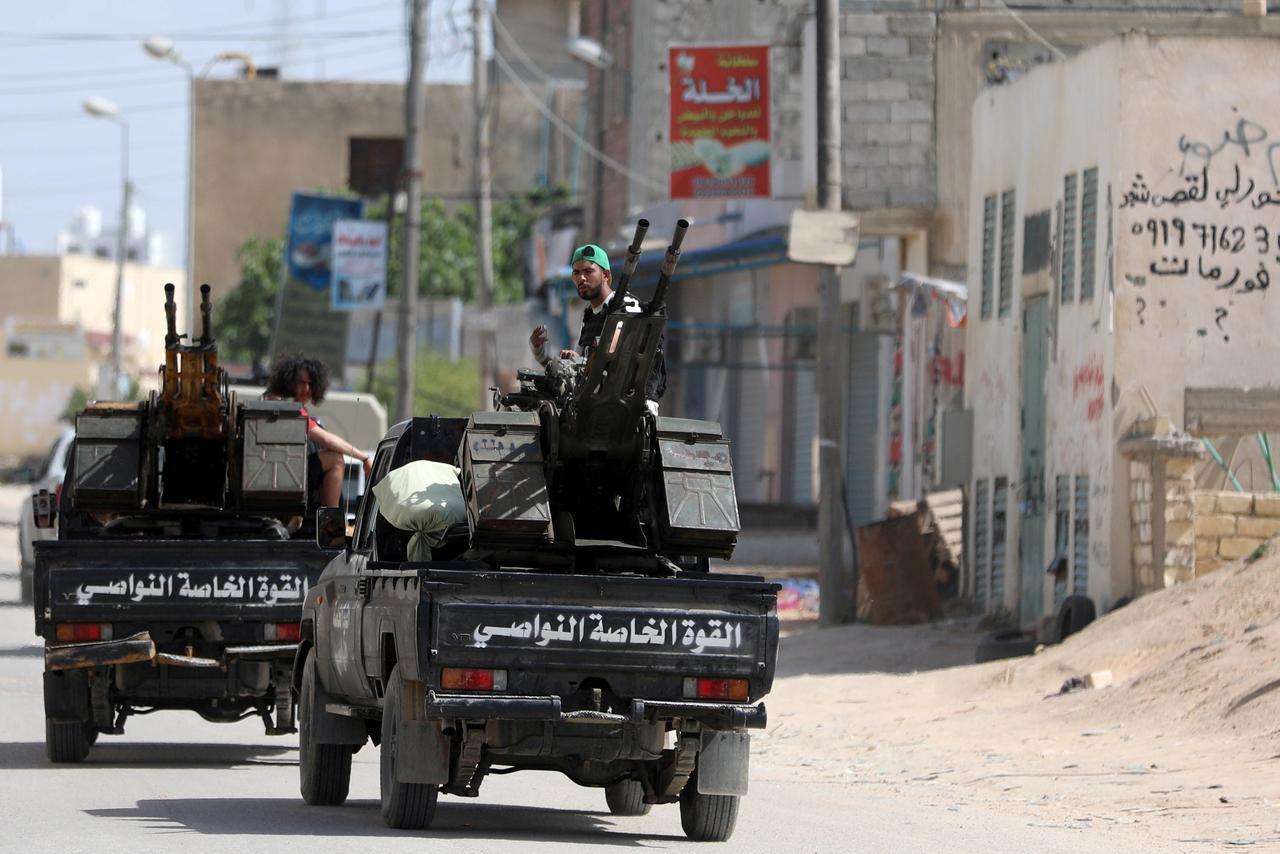
Members of Libyan internationally recognized pro-government forces ride in military vehicles on the outskirts of Tripoli, Libya April 10, 2019. (Reuters)
The presidents of Turkey and Russia, Recep Tayyip Erdoğan and Vladimir Putin, have issued a joint call on all parties to stop hostilities as of Jan. 12 after a bilateral meeting in Istanbul on Jan. 8.
Erdoğan and Putin released a joint statement after their meeting citing their shared views on the latest developments in the Middle East, Syria, and Libya.
“Under the current critical circumstances and in the light of the objectives set forth in the relevant U.N. Security Council resolutions, we have decided to take the initiative and, as intermediaries, call on all parties in Libya to stop hostilities as of 00.00 hours on 12 January, declare a sustainable ceasefire, supported by the necessary measures to be taken for stabilizing the situation on the ground and normalizing daily life in Tripoli and other cities, and immediately come together around a negotiating table with a view to putting an end to the sufferings of the Libyan people and bring back peace and prosperity to the country,” read the statement.
Turkey says won’t allow a fresh ring of fire in ME amid US-Iran tension

“We are confident that the Libyans can independently decide on the future of their homeland in the framework of a nation-wide dialogue taking into account the interests of all its citizens without exception,” it said.
The two leaders expressed their support to Germany-led Berlin Process which aims to create a conducive atmosphere to revitalize the U.N.-facilitated political process.
On Syria, the two presidents underscored the importance of keeping territorial integrity of the war-torn country and the support for the political efforts for a breakthrough.
“We underscore the necessity to establish calm in the Idlib de-escalation area by fully implementing all agreements on Idlib. We commit to work within the Astana Mechanism towards finding a lasting political solution in line with U.N. Security Council Resolution 2254, and to support the Constitutional Committee. We emphasize the need to increase humanitarian assistance to all Syrians without discrimination, politicization and preconditions,” it added.
Libya welcomes ceasefire call
Libya's parliament in Tripoli on Jan. 9 welcomed the joint call by Erdoğan and Putin.
"Any initiative must not affect the right of the National Accord government and its national army to defend the Libyan people and the capital [Tripoli]," the parliament statement read.
It also stated that the Libyan crisis should only be solved through political means.
The party that started the war -- Khalifa Haftar forces -- could not be part of any political solution, added the statement.
Referring to Egypt and the United Arab Emirates (UAE), the statement also called on the countries backing "traitor Haftar against the legitimate government to stop giving support for him and review their positions".
Meanwhile, Libya's High Council of State welcomed on Jan. 8 a ceasefire call.
“The statements by Turkish President Recep Tayyip Erdoğan and Russian President Vladimir Putin regarding the Libyan crisis and attack against the capital are welcomed by the High Council,” it said in a statement.
The High Council of State, which advises the U.N.-recognized Government of National Accord (GNA), said it will support all kinds of initiatives that address the welfare of Libyans and are aimed at ending the war.
The statement also noted that any call for dialogue should remain tied to the Libyan Political Agreement signed in the city of Suheyrat in Morocco.
Turkey calls on parties in Libya to return to positions of last year
Turkey mainly cares for the immediate end of clashes and the announcement of a cease-fire in Libya, presidential spokesperson İbrahim Kalın has said, calling on the parties in the country to return the positions they were in last year in April.
“In Libya, our priority is to stop the clashes as soon as possible, the declaration of a cease-fire and all parties, particularly [General Khalifa] Haftar, to return to their positions of April,” Kalın said after a cabinet meeting on late Jan. 7.
“The Haftar side, which violates the agreement between Tripoli and Benghazi that was signed in April, continues its attacks recklessly. If this is not stopped, a political process in Libya will not be possible and more blood will be shed,” he said.
When the parties withdraw to those positions, the political process will be opened, the Libyan summit planned in Berlin will have the opportunity and possibility to get results, he noted.
Last week Turkey’s parliament passed a motion allowing it to send troops as military aid to Libya’s U.N.-recognized Government of National Accord (GNA), which has been besieged by the forces of Haftar, a warlord based in eastern Libya.
Separately, Ankara and Tripoli’s GNA signed two separate pacts: One on military cooperation and the other on maritime boundaries of countries in the eastern Mediterranean.
Kalın also criticized the global community for not condemning attacks by Haftar.
“Haftar gets away with any kind of attack in Libya, the international community even does not condemn [him],” he said.